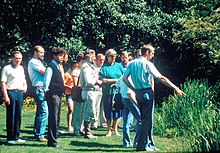Landscape Advisory Board

Landscape Advisory Council was the name given to the advisory councils at the landscape authorities in North Rhine-Westphalia (NRW) from 1975 to 2016 . The advisory boards were formed in accordance with Section 1 (1) of the Landscape Act to independently represent the interests of nature and the landscape . The members worked on an honorary basis for the bodies in which the advisory boards are set up. The advisory councils and their members were not bound by the instructions and guidelines of the landscape authority. In the interests of the common cause you should work towards a good and trusting cooperation between the advisory board and the landscape authority. When a new state nature conservation law came into force in NRW in 2016, the advisory boards were renamed as nature conservation advisory boards , as is common in other federal states.
tasks
The landscape law named generally ff. Tasks:
- The advisory boards are supposed to participate in the protection, maintenance and development of the landscape and to do so
- submit suggestions and suggestions to the competent authorities and bodies,
- convey to the public the intentions and goals of landscape management and nature conservation,
- Counteract undesirable developments in the landscape.
The landscape law names the powers of the advisory boards of the lower landscape authorities:
- the right to make proposals for the landscape guard (Section 13 (1) LG),
- the close cooperation with the district or the independent city in the preparation of the landscape plans (§ 27 a LG) and
- the right to object to applications for exemptions from nature and landscape protection laws and prohibitions within the meaning of Section 69 (1) sentence 3 LG.
In this sense, the landscape advisory councils are also allowed to contact other authorities and interest groups, and to pass on information to the press, radio and television, but not without informing their landscape authority in advance. Conversely, all information about claims and intended interventions in the landscape of their area of responsibility should also be brought to the advisory boards at an early stage. In contrast to the municipal parliaments , the advisory councils have no authority. Advisory boards are set up for the lower, higher and highest landscape authorities. The responsibilities of the advisory boards correspond to the responsibilities of these authorities. The advisory councils of the lower landscape authorities are solely responsible for measures of purely local importance, for example maintenance measures in the communal area. So there is no hierarchy between the advisory boards. The responsibilities of the authorities and, accordingly, those of the advisory boards are detailed in the Landscape Act. The work of the advisory councils is not limited to reactions, the advisory councils can also take up topics that they consider necessary.
composition
Interest groups who use the landscape or who have demands on the design or protection of the landscape are represented on the advisory boards. This includes representatives from agriculture and forestry, anglers and hunters, sports clubs and, in particular, nature conservation associations (e.g. BUND ). At the suggestion of these interest groups, the members are elected by the representative bodies (advisory board at the lower landscape authority) or the competent authority. The members elect a chairman who represents the advisory board externally. The meetings of the advisory boards are public.
Web links
Individual evidence
- ↑ § 70 State Nature Conservation Act North Rhine-Westphalia
- ↑ Section 11 (5) of the NRW Landscape Act.